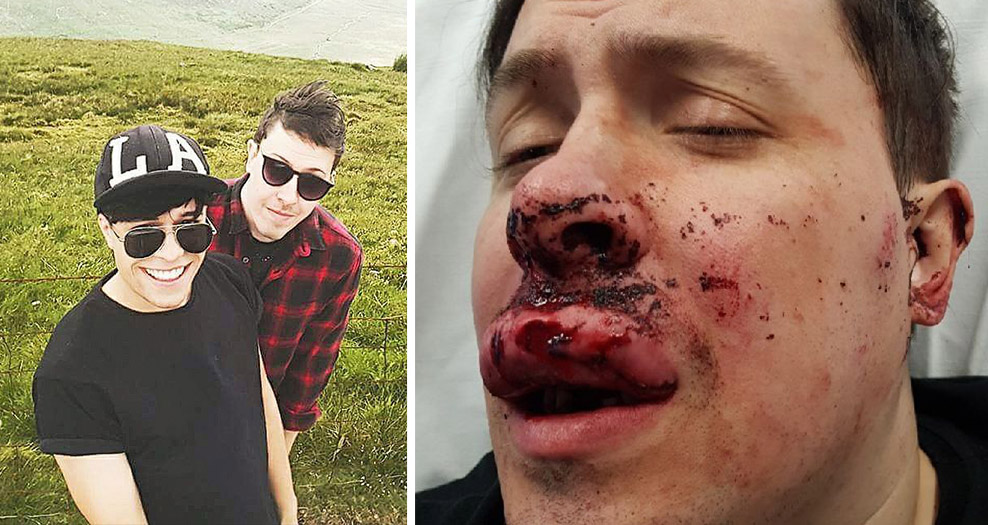“Too many of us are being targeted simply on account of our identity and who we are.”
During the recent Dublin Pride celebrations, there was a spate of anti-LGBT+ attacks, including a brick being thrown through the window of Panti Bar during opening hours, while a post about a man being punched in the face in another city centre pub for holding a Pride Flag went viral on social media. In the weeks previous to the parade, which attracted double the numbers of last year’s Pride, there was a vicious assault on a young gay couple in Laois (pictured above), who were beaten by a gang of thugs with hurls. Amidst this, Ireland stands virtually alone in the western world in not having a hate crime law on its statute books.
The absence of such clearly needed legislation is a cause of major concern for our community, as evidenced by the findings of ‘Burning Issues 2’ – the most comprehensive research into the views and priorities of LGBT+ people, which was published in 2016 by GCN’s publishers, the National LGBT Federation (NXF). The survey revealed that a Hate Crime law is now the number one priority for the LGBT+ community in post-marriage equality Ireland.
The publication of a report into Hate Crimes this month underlined the fact that attacks on LGBT+ people are not isolated incidents. ‘Life Cycle of a Hate Crime’, published by the Irish Council For Civil Liberties (ICCL), revealed that Ireland has the second highest rate of transphobic hate crime in Europe. Other research published in recent years contained similarly disturbing findings and showed that Ireland lags far behind most comparable European countries in putting in place the necessary laws and procedures to address hate-motivated crimes.
At a political level, we have seen the publication of a Bill from Fianna Fáil TD Fiona O’Loughlin, but which has languished in what is known as the pre-legislative stage of the Oireachtas process since early 2017. A group of academics based at the University of Limerick and who specialise in the area of Hate Crime have also published a draft Bill. The proposal from the Hate & Hostility Research Group calls for a specific Hate Crime offence to be incorporated into Irish law as opposed to providing for aggravated sentencing. Meanwhile, a national steering group composed of civil society organisations committed to seeing the enactment of legislation in this area has also been formed, which includes LGBT+ representation.
Incitement to Hatred Legislation
In the Seanad last week, Senator Fintan Warfield challenged the Junior Minister with responsibility for Equality, David Stanton, on the issue. In his response, Minister Stanton claimed that “other countries with hate crime law have major problems – we do not”. He further pointed to the existence of Incitement to Hatred legislation, enacted in 1989, and which is currently the subject of a review.
Incitement to Hatred legislation was designed to capture hateful and extremist speech and communication, and while similar to Hate Crime, is not the same thing. It is also concerning to note that there has not been one successful prosecution in Ireland under this Act and a review of its workings is necessary to say the least.
As the ICCL report makes only too clear, Ireland does have ‘major problems’ in the area of Hate Crime. The research is quite unambiguous and should provide the necessary impetus to bring forward a robust, LGBT+ inclusive law. In his response to the ICCL report, Justice Minister Charlie Flanagan pledged that it would help inform government’s approach to the issue with the aim of introducing legislation.
To ensure that a Hate Crime law proves more robust and effective than the aforementioned Incitement to Hatred legislation, it needs to be accompanied by comprehensive training for all those who work in the criminal justice system. There already exists in Ireland a chronic underreporting of crimes committed against LGBT+ people. Proactive, confidence-building measures and firm reassurances that homophobic and transphobic motivated crimes will be treated with the utmost seriousness are thus required.
Too many of us are being targeted simply on account of our identity and who we are. To a hateful and bigoted minority, the increased visibility of LGBT+ people motivates a violent and abusive response. Our community will not, however, compromise on our right to live our lives openly, proudly and authentically and it is precisely that increased visibility in a society that has prompted the equality gains of recent years.
We are not helped, however, by the fact that Ireland is such an outlier when it comes to an effective response to hate-motivated crimes. The ‘Burning Issues 2’ research provides LGBT+ groups with a clear mandate to lobby for a specific Hate Crime law and that advocacy will continue in conjunction with other civil society actors and political allies until such legislation is enacted.
© 2018 GCN (Gay Community News). All rights reserved.
